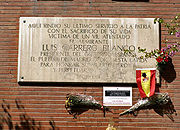
Operación Ogro
Encyclopedia

ETA
ETA , an acronym for Euskadi Ta Askatasuna is an armed Basque nationalist and separatist organization. The group was founded in 1959 and has since evolved from a group promoting traditional Basque culture to a paramilitary group with the goal of gaining independence for the Greater Basque Country...
(Euskadi Ta Askatasuna; Basque for "Basque Homeland and Freedom") to the assassination of Luis Carrero Blanco the Prime Minister of Spain
Prime Minister of Spain
The President of the Government of Spain , sometimes known in English as the Prime Minister of Spain, is the head of Government of Spain. The current office is established under the Constitution of 1978...
in 1973. This attack was carried out on 20 December 1973.
An ETA commando group using the code name Txikia (after the nom de guerre of ETA activist Eustakio Mendizabal killed by Guardia Civil
Civil Guard (Spain)
The Civil Guard is the Spanish gendarmerie. It has foreign peace-keeping missions and maintains military status and is the equivalent of a federal military-status police force. As a police force, the Guardia Civil is comparable today to the French Gendarmerie, the Italian Carabinieri and the...
in April 1973) rented a basement flat at Calle Claudio Coello 104, Madrid
Madrid
Madrid is the capital and largest city of Spain. The population of the city is roughly 3.3 million and the entire population of the Madrid metropolitan area is calculated to be 6.271 million. It is the third largest city in the European Union, after London and Berlin, and its metropolitan...
on the route over which Luis Carrero Blanco used to go to mass
Mass (liturgy)
"Mass" is one of the names by which the sacrament of the Eucharist is called in the Roman Catholic Church: others are "Eucharist", the "Lord's Supper", the "Breaking of Bread", the "Eucharistic assembly ", the "memorial of the Lord's Passion and Resurrection", the "Holy Sacrifice", the "Holy and...
at San Francisco de Borja church.
Over five months, the group dug a tunnel under the street - telling the landlord that they were student sculptors to disguise their real purpose. The tunnel was packed with 80 kg of explosives that had been stolen from a Government depot.
On 20 December 1973, a three man ETA commando group disguised as electricians detonated the explosives by command wire as Blanco's Dodge Dart passed. The explosion sent Luis Carrero Blanco and his car 20 metres into the air and over a five storey building. The car crashed down to the ground on the opposite side of a Jesuit college, landing on the second-floor balcony. Luis Carrero Blanco survived the blast but died shortly afterwards. His bodyguard and driver were killed instantly. The "electricians" shouted to stunned passers-by that there had been a gas explosion, and subsequently escaped in the confusion. ETA claimed all responsibility on 22 January 1974.
In a collective interview justifying the attack, the ETA bombers commented:
This killing was not condemned and in some cases was even applauded by the Spanish opposition in exile. For some Carrero Blanco's death was an instrumental step for the posterior establishment of democracy
Democracy
Democracy is generally defined as a form of government in which all adult citizens have an equal say in the decisions that affect their lives. Ideally, this includes equal participation in the proposal, development and passage of legislation into law...
, by eliminating Franco's choice of successor. In regard to Carrero's death, the former ETA member now turned anti-nationalist author Jon Juaristi
Jon Juaristi
Jon Juaristi Linacero is a Spanish poet, essayist and translator in Spanish and Basque, as well as a self-confessed former ETA militant...
contends that ETA's goal with this particular killing was not democratization but a spiral of violence as an attempt to fully destabilize Spain, increase Franco's repression against Basque nationalism and subsequently put the average citizen in the Basque country in the situation where they would have had to accept the lesser evil
Lesser of two evils principle
The lesser evil or lesser of two evils principle is the idea in politics and political science that of two bad choices, one isn't as bad as the other, and should be chosen over the one that is a greater threat....
in the form of ETA's reaction against Franco's unleashed repression.
See also
- Operación Ogro (film)Operación Ogro (film)Operación Ogro is a 1979 Spanish and Italian drama film written and directed by Gillo Pontecorvo.The film is based on true events, following the eponymous book by Julen Aguirre .The film won David di Donatello as Best Film....
, film about the attack.

